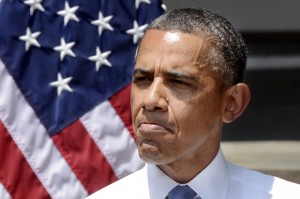Why Obama’s Keystone XL Climate Change Comments Confused Everyone
-
Joe Wertz

MICHAEL REYNOLDS / Landov
President Barack Obama on June 25 spoke about efforts to reduce carbon pollution and the effects of climate change, to a crowd at Georgetown University.
It’s hard to know where President Barack Obama stands on the Keystone XL pipeline project, which still awaits his approval.
Obama has rejected Transcanada’s permit for the Canada-to-Texas pipeline in the past, but championed parts of the project during a 2012 trip to the pipeline’s hub in Cushing, Oklahoma.
And the president’s climate change address at Georgetown University hasn’t cleared anything up for either side of the Keystone cause. Big oil and environmentalists alike were puzzled, USA Today’s David Jackson reports:
Some supporters of the proposed pipeline believe Obama signaled eventual approval; some opponents believe he previewed rejection.
Much of the Obama befuddlement centers on different interpretations of one part of his speech, writes Forbes’ staffer Christopher Helman: “Obama said that the Keystone XL pipeline would only be approved if it ‘does not significantly exacerbate the problem of carbon pollution.'”
“Exacerbate” isn’t exactly and exacting term, Helman writes.
It means to aggravate, to sharpen, or to make a bad problem worse. The anti-Keystone crowd naturally thinks that the pipeline, or anything that aids in the transport of oil sands crude, would exacerbate carbon emissions. But that’s not what the State Department found.
Politico’s Talia Buford focused on another wiggly word: “significantly,” and thinks the speech hinted at an eventual approval of the pipeline, which would transport crude from the tar sands of Albetra through Oklahoma to refineries on Texas’ Gulf Coast.
… he announced what sounded like a daunting environmental threshold for the controversial Keystone XL oil pipeline — that the project can’t go forward if it would “significantly” increase greenhouse gas emissions.
What he didn’t mention: His own State Department has already indicated that the pipeline can meet that standard.
